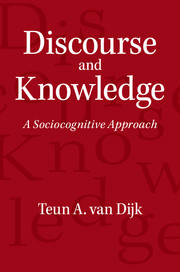
-
Select format
-
- Publisher:
- Cambridge University Press
- Publication date:
- 05 August 2014
- 17 July 2014
- ISBN:
- 9781107775404
- 9781107071247
- 9781107416550
- Dimensions:
- (228 x 152 mm)
- Weight & Pages:
- 0.69kg, 407 Pages
- Dimensions:
- (228 x 152 mm)
- Weight & Pages:
- 0.59kg, 407 Pages
- Subjects:
- Psychology, Cognition, Language and Linguistics, Discourse Analysis
You may already have access via personal or institutional login- Subjects:
- Psychology, Cognition, Language and Linguistics, Discourse Analysis
Book description
Most of our knowledge is acquired by discourse, and our ability to produce and understand discourse is impossible without the activation of massive amounts of knowledge of the world. Both 'discourse' and 'knowledge' are fundamental concepts of the humanities and social sciences, but they are often treated separately. Based on a theory of natural knowledge, the book deals with the cognitive processes, social distribution, cultural differences and the linguistic and discursive 'management' of knowledge in interaction and communication in epistemic communities. The first book to adopt a multidisciplinary approach to studying the relationship between the two concepts, Discourse and Knowledge introduces the new field of epistemic discourse analysis. Using a wide range of examples to illustrate the theory, it is essential reading for both students and academics interested in epistemology, linguistics, discourse analysis, cognitive and social psychology and the social sciences.
Reviews
'A real treasure for anybody interested in the intricate complexities of human knowledge.’
Ruth Wodak - Distinguished Professor of Discourse Studies, Lancaster University
‘A wide-ranging study of the mutual dependence of knowledge and discourse, including a valuable review of relevant studies in a variety of disciplines and new insights into how these studies can be brought together.’
Wallace Chafe - Research Professor of Linguistics, University of California, Santa Barbara
Contents
Metrics
Full text views
Full text views help Loading metrics...
Loading metrics...
* Views captured on Cambridge Core between #date#. This data will be updated every 24 hours.
Usage data cannot currently be displayed.
Accessibility standard: Unknown
Why this information is here
This section outlines the accessibility features of this content - including support for screen readers, full keyboard navigation and high-contrast display options. This may not be relevant for you.
Accessibility Information
Accessibility compliance for the PDF of this book is currently unknown and may be updated in the future.


